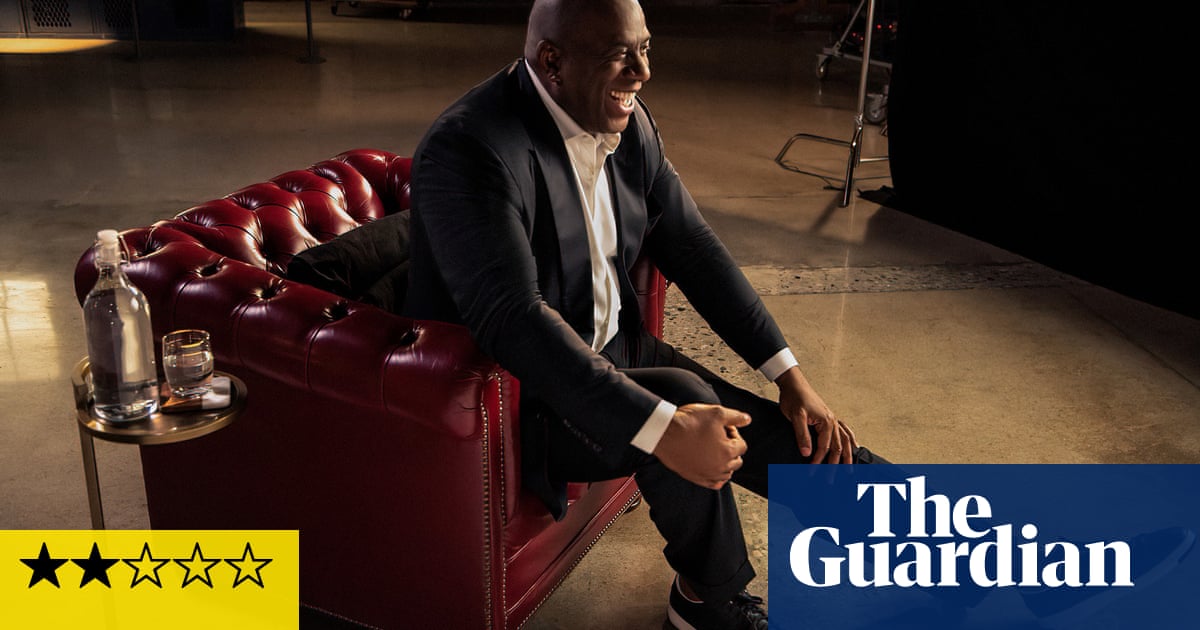They Call Me Magic review – Earvin ‘Magic’ Johnson is calm, pleasant and lacking a sense of humor - 4 minutes read

In the fourth and final episode of They Call Me Magic (Apple TV+), Earvin “Magic” Johnson – one of the finest basketball players of all time – sits comfortably, smiles widely and assesses his own merits. “All the things I was on the basketball court, I am as a businessman. Disciplined. Focused. Building a strategy.” While these may well be the qualities needed to become a multimillionaire sporting hero, they are not the traits that make for a gripping sports documentary.
They Call Me Magic is a story of obstacles overcome, but Johnson hurdles them all so easily that no drama develops. He grows up in an honest, blue-collar family in Lansing, Michigan, his mother working in a school cafeteria while his father does long shifts at a car plant. Honing his basketball skills in pickup games against grown men, Earvin Johnson Jr soon has scalpers trading tickets outside his high school matches, is given the nickname “Magic” and proceeds smoothly to college level, where he leads Michigan State to the 1979 NCAA championship. The cloud of his unglamorous upbringing clears.
Johnson skips the final year of college and turns pro, joining the Los Angeles Lakers and helping them reach the 1980 NBA finals. When star player Kareem Abdul-Jabbar gets injured and is absent for the crucial Game 6, the 20-year-old Johnson takes over, operating out of position at center instead of point guard and turning in one of the greatest single-game performances in NBA history. The Lakers win and go on to dominate the 1980s, with Johnson coming out on top in his rivalry with the Boston Celtics’ Larry Bird. Meanwhile, Magic enjoys the celebrity lifestyle, refusing for years to commit to childhood sweetheart, Cookie, although in interview this doesn’t seem to have caused Cookie Johnson – so we know how that story ends – any great distress. Magic is worth dutifully waiting for: he’s busy being the best.
It’s not obvious as to how exactly Johnson ruled his sport since, although it has plenty of cracking archive footage of the media hoopla around the Lakers, the series features hardly any basketball action. Perhaps it’s afraid of alienating those with little knowledge of a game that, because it is high-scoring and based on gradually asserted supremacy rather than spectacular moments, is hard to sum up in clips. Combine basketball’s opacity with the blandly pleasant positivity of the interviewees, and you have a documentary where everything seems to just happen naturally.
Johnson is a calm, pleasant presence throughout, often laughing heartily at the end of the most banal anecdotes, in the manner of someone who has never failed for long enough to sharpen a sense of humour. The way serious issues pose virtually no threat to him does, however, border on comical. The NBA at the dawn of the 1980s is a ratty spectacle blighted by violence, scant live TV coverage and racial tensions, but Johnson’s arrival seems to fix all this overnight. The shock of him being diagnosed as HIV positive in 1991 leads only to a brief period of introspection before he cheerfully embraces the challenge of destigmatising the condition. Even the Rodney King riots in LA serve mainly as inspiration for Johnson’s post-retirement entrepreneurialism, giving him the idea to open cinemas, gyms and Starbucks franchises in previously desolate inner cities. This goes so well that he ends up buying the LA Dodgers, who duly win baseball’s World Series. Which is nice.
Any personal demons are soon straightened out, while Johnson’s enemies are charmed or easily vanquished, or both. The closest the Magic story has to an antagonist is probably Isaiah Thomas, the Detroit Pistons point guard who is Johnson’s practice buddy in the off season for years, until the Pistons face the Lakers in the 1988 NBA Finals. Johnson remorselessly smashes Thomas on the court, their friendship ends, and the Magic carnival moves frictionlessly on. You long for him to display the childish inadequacy of Paul Gascoigne, the cold supervillain vibes of Tom Brady or the addiction to conflict of Michael Jordan. Not that Jordan has any conflict with Johnson, despite helping to end his career by succeeding him as the NBA’s most dominant player: they hug after matches and then team up as the USA flatten all comers at the 1992 Olympics.
The makers of They Call Me Magic can essentially get whoever they like to appear, such is Johnson’s pull, giving the show a rich, luxury feel. The Lakers superfan celebrating how the team lit up life in his tough LA neighbourhood? Snoop Dogg. The old guy who remembers how big a deal it was when the NCAA regional final saw his local team, Arkansas, take on Larry Bird’s Indiana side? Bill Clinton. Barack Obama pops up a couple of times to say nothing of note.
Source: The Guardian
Powered by NewsAPI.org